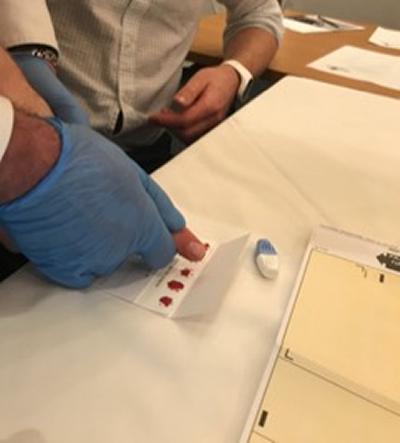City-wide health campaign aims to eliminate hepatitis C

A new approach to prevent liver scarring caused by the hepatitis C virus is being launched across Southampton, by Faculty researchers.
Hepatitis C can remain unnoticed in people carrying it, until it starts to cause serious damage to the liver. The virus is treatable with a two to three-month course of medication, but people at risk of infection need to get tested.
Faculty of Medicine researchers are working alongside University Hospitals Southampton NHS Foundation Trust, Solent NHS Trust and Southampton City Council to set up testing points at pharmacies throughout Southampton to help identify people with hepatitis C.
A simple blood spot test can identify the virus and alert a specialist doctor based at the hospital, who will then offer advice and links to treatment.
NHS England has set a target of eliminating hepatitis C by 2025 and following on from a successful research trial on the Isle of Wight, Dr Ryan Buchanan and Dr Charlotte Cook have been training pharmacists to carry out the blood spot test in Southampton to extend the work.
The original research on the Island was funded by the National Institute for Health Research.
Dr Buchanan says: “One of the big challenges of this work has been to find people who carry the virus. Having the test in a pharmacy is more accessible than booking an appointment with a GP or going to a hospital. The treatment of Hepatitis C is now much easier to take as it can be given as just one pill a day for a few months. It is now within our reach to eliminate the virus from the City of Southampton.”
The service was officially launched at a recent event at the Mayoral Chambers at the Civic centre in Southampton.
Cllr Dave Shields, Cabinet Member for Health and Wellbeing, Southampton City Council, said: “We are delighted that local people will be able to be tested for hepatitis C in pharmacies. Unfortunately, many people have the virus and just don’t know until it’s too late. Yet testing and treatment are easy – just a finger prick blood test and tablets. We are excited to support the Southampton clinical and research teams in their work to eliminate Hepatitis C”
People are at risk of getting hepatitis C through taking injected drugs, having a dental or medical treatment in a high-risk country, having a tattoo or piercing with non-sterile equipment, receiving an infected blood transfusion or having sexual contact with an infected person.
In addition to testing for hepatitis C, the blood spot can also identify the HIV virus and the hepatitis B virus, and the team is working with the sexual health services run by Solent NHS Trust to help treat HIV.